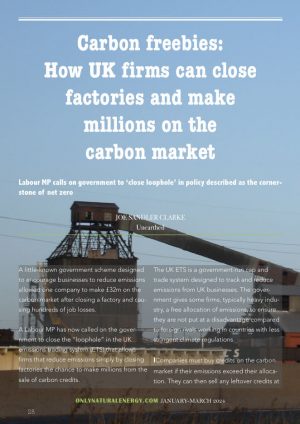 A little-known government scheme designed to encourage businesses to reduce emissions allowed one company to make £32m on the carbon market after closing a factory and causing hundreds of job losses.
A little-known government scheme designed to encourage businesses to reduce emissions allowed one company to make £32m on the carbon market after closing a factory and causing hundreds of job losses.
A Labour MP has now called on the government to close the “loophole” in the UK emissions trading system (ETS) that allows firms that reduce emissions simply by closing factories the chance to make millions from the sale of carbon credits.
The UK ETS is a government-run cap and trade system designed to track and reduce emissions from UK businesses. The government gives some firms, typically heavy industry, a free allocation of emissions, to ensure they are not put at a disadvantage compared to foreign rivals working in countries with less stringent climate regulations.
It’s completely senseless to send emissions allowances to ghost plants. It doesn’t serve climate goals or any economic purpose
– Sam Van den plas, carbon market expert
Companies must buy credits on the carbon market if their emissions exceed their allocation. They can then sell any leftover credits at the end of the year. UK ETS, which is modelled on the EU’s scheme, has been described as the “cornerstone” of the UK’s net zero strategy.
US firm CF Industries announced it would close its fertiliser works in Ince, Cheshire in June 2022, leading to the loss of 350 jobs, citing high energy costs. Closing the facility halfway through 2022 meant CF’s annual emissions were much lower than the previous year, leaving the company with hundreds of thousands of unused carbon credits.
Unearthed has learned there is nothing to stop firms selling unused credits generated from closing a factory, under UK ETS rules, and the government has no way of clawing back unused credits once they have been allocated. That means CF is free to sell the Ince facility’s leftover 630,000 credits from 2021 and 2022, which are worth £49m using the average UK carbon price from 2022 of £78 a tonne.
CF made £32m from the sale of carbon credits under UK ETS, according to its most recent UK accounts. In the first six months of the year, its parent company CF Industries, which is headquartered in Illinois, made three times what it made from carbon credit sales compared to the same period in 2022, according to filings to the US regulator.
A spokesperson for the Department for Energy Security and Net Zero said: “Where a company closes or leaves the UK, their allowances are no longer distributed in the following year.”
The government is reviewing the rules on free allocation, but no changes will be made to the policy until 2026 at the earliest.
CF followed the closure of its Cheshire factory with the announcement in late July that it would shut its ammonia plant in Billingham, Teesside, after that facility had been idle since the previous September, causing 38 job losses. That plant recorded a 26% drop in emissions in 2022, thanks in part to being closed for the last four months of the year, leaving CF Industries with 249,000 leftover credits, worth £19.4m at 2022’s average UK carbon price.
CF Industries, which received millions in taxpayer money in 2021 to support CO2 production to ease a possible food crisis, did not respond to requests for comment from Unearthed.
Sam Van den plas, policy director at Carbon Market Watch, told Unearthed: “Under current rules, a factory that closes on January 2nd will receive free emissions allowances for the whole year, and the government has no way to get that back. It’s completely senseless to send emissions allowances to ghost plants. It doesn’t serve climate goals or any economic purpose.”
Mitsubishi Chemical closed its Cassel works chemical plant in Billingham, Teesside at the end of May, leaving 205 staff jobless. Production at the facility had been halted since February 2022. The plant had been the site of industrial activity for almost a century, with British conglomerate ICI producing fertilisers in Billingham as far back as the 1920s.
The closure led to a dramatic drop in emissions from 2021 to 2022. In 2021, the plant recorded 182,000 tonnes of CO2e compared to a little over 6,000 in 2022. This drop-off left Mitsubishi with 155,000 of unused allocation, worth about £12.1m at 2022’s average carbon price.. Mitsubishi refused to tell Unearthed what it planned to do with its leftover free allocation, claiming commercial confidentiality.
There is no deadline on when firms have to sell leftover allocations, meaning they can wait until the carbon price is high to sell up. The UK carbon price fell to an all-time low of £33 in late September. It hit a peak of £100 last year.
Alex Cunningham, a Labour shadow justice minister whose Stockton North constituency includes Billingham, told Unearthed: “Good local jobs were lost when Mitsubishi and CF Fertilisers closed their operations on Teesside so it is nothing short of outrageous that these companies continue to make tens of millions through the sale of their emissions credits due to a loophole in the UK ETS.”
He added: “The government should look to close these loopholes immediately, and put a stop to this shameful profiteering on the back of lost livelihoods.”
One company with a large excess allocation due to a factory closure told Unearthed it had no intention of selling its unused credits. Cemex, a Mexican cement giant with a turnover of around $15bn a year, put its plant in South Ferriby, North Lincolnshire on “operational standby” in July 2020, leading to the loss of 110 jobs. The factory has been inactive ever since, recording emissions of just one tonne of CO2e in 2021 and 2022. Still, it received 338,000 credits in that time, worth more than £26m at the average UK carbon price for 2022.
A Cemex spokesperson told Unearthed the company has “ring-fenced” the excess allocation and that it will be “returned to the UK Registry when they have updated our registry account.” He added that the over-allocation is “outside of Cemex’s control and is due to the timings of the scheme, with a reconciliation process underway”.
Leo Murray, the co-founder of the climate advocacy group Possible, told Unearthed: “Turning carbon emissions into a commodity for trade has never been about what’s best for the planet or for people, but what’s best for financial markets. So it is no surprise to find that companies are being richly rewarded under the UK’s scheme for closing factories and sacking workers, chalking this up as somehow about the net zero target, even while in the real world no meaningful progress on industrial decarbonisation has been made.”
“When the UK left the EU, we had the opportunity to move away from market dogma and elaborate shell games and implement a simple carbon tax instead, which would have made the kinds of perverse but entirely predictable outcomes revealed in this investigation impossible.”
Originally published
by Unearthed Greenpeace
October 23, 2023

